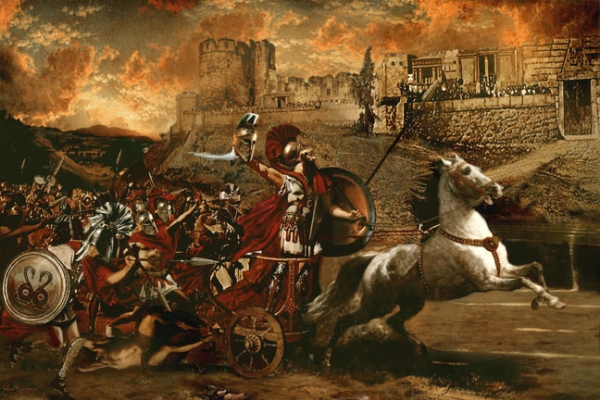
The Trojan War is probably one of the most important events that have been narrated in Greek mythology. It was a war that broke out between the Achaeans (the Greeks) and the city of Troy. The best known narration of this event is the epic poem Iliad, written by Homer.
Zeus believed that the number of humans populating the Earth was too high and decided it was time to decrease it. Moreover, as he had various affairs with mortal women and fathered demigod children, he thought it would be good to get rid of them. He formed a plan after he learned of two prophecies; one of them said that he would be dethroned by one of his sons, just like he had done with his own father, Cronus; the other prophecy mentioned that the sea nymph Thetis, for whom Zeushad fallen, would give birth to a son that would surpass his father in glory. So, Zeus decided to marry Thetis to King Peleus.
The god of gods organised a grand feast in celebration of Peleus' and Thetis' marriage, in which all of the gods and important figures were invited, except the goddess of strife, Eris. The goddess was stopped at the door by Hermes, infuriating her. Before she left, she threw her gift amidst the guests; the Apple of Discord, a golden apple on which the words "to the fairest" had been inscribed. Hera, Athena, and Aphrodite started quarreling over who should be the one to take the apple, and demanded that Zeus decide on this matter. Zeus knew that if he made a choice, he would cause the anger of the other two that wouldn't be picked, and decided to abstain; instead, he appointed Paris, the young prince of Troy, as the judge. Paris could not make a decision, even after seeing the three goddesses naked, so they started bribing him; Hera said that he would get political power and be the ruler of the continent of Asia; Athena would give him wisdom and great skills in battle; and Aphrodite offered him the most beautiful woman in the world, Helen of Sparta. Paris gave the apple toAphrodite, and returned to Troy.
Peleus and Thetis had a son, Achilles, for whom two prophecies had been made; one was that he would either lead an uneventful but long life, or a glorious one but he would die young at a battlefield; the other prophecy was that without his help, the city of Troy would never fall. Afraid for her son's life, Thetis decided to grant immortality to him. When he was still an infant, she took him to the River Styx, one of the rivers that ran through the Underworld, and dipped him in the waters, thus making him invulnerable. However, Thetis did not realise that the heel of the boy, from which she was holding him, did not touch the waters and remained mortal; this would later be the doom of Achilles, and is the origin of the modern day phrase "Achilles' heel", signifying a vulnerable point. After the ritual, she dressed him as a girl and hid him at the court of King Lycomedes of Skyros.
Meanwhile, the most beautiful woman in the world, Helen, was the daughter of King Tyndareus of Sparta, and many noble suitors had arrived to claim her hand in marriage. Tyndareus did not want to make a choice for fear of causing political tensions, and stalled the decision. One of the suitors, Odysseus, offered to help solve the situation, asking in return for the hand of Penelope; Tyndareus agreed, and Odysseus asked that all suitors swear an oath that they would protect the couple no matter who the groom would be. After the oath was taken, Tyndareus pickedMenelaus as his daughter's husband, effectively making him the successor of the Spartan throne through Helen. However, Menelaus causedAphrodite's wrath, after failing to sacrifice one hundred oxen for her as he had promised; this is why Aphrodite decided to help Paris win Helen's heart. The goddess made a plan and disguised Paris as a diplomatic emissary. He then went to Sparta, where Helen welcomed him, while her husband was away in Crete to bury his uncle. At that point, the god of love, Eros, shot an arrow to her, thus causing her to fall in love with the Trojan prince. The two lovers eloped and left for Troy.
Menelaus returned home and realised what had happened. Along with Odysseus, they went to Troy to get Helen back, but all diplomatic attempts failed. So, Menelaus invoked the Oath of Tyndareus, and, helped by his brother Agamemnon, called all Achaean leaders who had previously been the suitors of Helen to fulfill their oath. They also needed the help of Achilles, as they knew of the prophecy that Troy would only fall with his help. Odysseus, Telamonian Ajax and Phoenix went to Skyros where they knew Achilles was hidden disguised as a woman. There, they either blew a warhorn, on the sound of which Achilles was the only woman that took a spear in hand; or they appeared as merchants selling jewels and weapons, and Achilles was the only woman interested in the latter.
Having Achilles with them, all leaders gathered at the port of Aulis. A sacrifice was made to Apollo, and the god sent an omen; the Achaeans saw a snake appear from the altar that slithered to a bird's nest, where it ate the mother and her nine babies before it was turned to stone. The seerCalchas said that this meant Troy would fall in the tenth year of the war. The Achaeans set sail for Troy, although no one knew the way. By mistake, they arrived in Mysia, ruled by King Telephus; after a battle, during which Achilles wounded the king, the Achaean ships sailed but a storm scattered them. Telephus' wound would not heal, and an oracle told him it would be healed by the person who inflicted it. When Telephusconfronted Achilles, he said he did not have any medical knowledge; Odysseus then proposed that the spear that caused the wound might help, so pieces of metal were used and the wound was healed. Telephus then told them how they would reach Troy.
Due to the storm that scattered the fleet, the Achaean leaders eventually gathered in Aulis again eight years later. However, they were unable to set sail because there was no wind. Calchas realised that this was a punishment from the goddess Artemis, who was furious at Agamemnon for killing a sacred deer. Artemis demanded that Agamemnon's daughter Iphigenia be sacrificed. Although Agamemnon initially refused, he reluctantly agreed in the end, and tricked his wife Clytemnestra and Iphigenia to go to Aulis, saying that Iphigenia was to marry Achilles. When they arrived to Aulis and understood what was going on, Clytemnestra cursed Agamemnon and was the reason she murdered him after the war was over. Iphigenia gracefully accepted her fate and placed herself on the altar; however, just as Calchas was about to sacrifice her, Artemissubstituted the woman for a deer and took her to Tauris where she became the goddess' high priestess. Nevertheless, no one saw what happened on the altar except Calchas, who was bound not to say anything.
The winds picked up again after the sacrifice and the Achaean fleet was finally able to set sail. They made a stop at the island of Tenedos, whereAchilles killed the king, who was the son of the god Apollo. Thetis had warned her son not to kill the king, lest he be killed by the god himself. This was also a foretelling of the hero's fate. While on the island, the Greeks sent a diplomatic mission to Troy asking for Helen, but it was refused into the city. So the fleet sailed on its final leg of the journey.
When the fleet arrived, they were all reluctant to disembark, as a prophecy said that the first Greek to step on Trojan soil would be the first to die in the war. Finally, Odysseus decided to disembark first; however, he threw his shield on the ground and stepped on it, while Protesilaus who followed him landed on the ground. Thus it was Protesilaus who died first, during a single combat against the Trojan prince Hector.
The siege of Troy lasted nine years, but not being complete, Troy was still able to maintain trade links with other Asian cities, as well as get reinforcements. At the end of the ninth year, the Achaean army mutinied and demanded that they return home, but Achilles eventually convinced them to stay longer.
On the tenth year, the priest of Apollo, Chryses, went to Agamemnon and asked for his daughter Chryseis' return, who had been taken as a concubine. Agamemnon refused, and Chryses prayed to Apollo, who inflicted the Greek army with plague. Agamemnon returned Chryseis to her father, but instead took Achilles' concubine for his own. Achilles, infuriated, said he would no longer fight and stayed in his tent. Although theAchaeans initially won a few battles, Achilles' refusal to fight led to a series of defeats, to the point that the Trojans almost set fire to the Greek ships. Then, Patroclus, a close friend of Achilles, took command of the Myrmidon army, but was slain in battle by Hector. Achilles, maddened with grief, swore vengeance; Agamemnon returned the concubine back to him and the two leaders reconciled. The Greek army was again victorious, and Achilles eventually managed to kill Hector; he refused to give Hector's body to the Trojans for burial, and instead, he desecrated it by dragging it with his chariot in front of the city walls. He eventually agreed to return it, after King Priam of Troy pleaded for his son's proper burial.
Achilles later died by a poisonous arrow that Paris shot against him. The arrow was guided by the god Apollo and hit Achilles on his heel, which was the only vulnerable spot of the hero's body. Achilles was burned on a funeral pyre and his bones were mixed with those of his close friendPatroclus. Paris was killed later by Philoctetes, using Heracles' bow.
Odysseus devised a plan to end the war for good. He asked that a wooden horse be built that was hollow inside. Soldiers hid in the interior of the horse, which was brought in front of the city gates, saying that it was a gift from the Greeks, showing the withdrawal of the Greek army and the end of the war. The Trojans happily accepted and brought the horse inside the city. They then started feasting and celebrating the victory. During the night, the Greek soldiers went out of the horse and started slaying the drunk Trojans. In the battle that followed, a huge number of soldiers died but eventually, Troy fell. The Greeks burned it and raided it, at the same time committing offences against many gods, by destroying temples and sacred grounds. Although victorious, most heroes and Greek soldiers either never returned home or returned after many adventures, as the gods were infuriated.
The Trojan War marked the end of the Heroic Age of Man, according to Hesiodus, and the transition of the world to the Iron Age. Zeus' attempt to depopulate the earth and kill a number of demigods and heroes proved successful.




